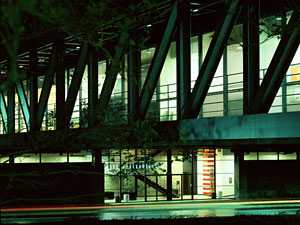Art Center College of Design
| Art Center College of Design | |
|---|---|
 | |
| Motto | Learn to create. Influence change. |
| Established | 1930 |
| Type | Private |
| President | Lorne M. Buchman |
| Provost | Fred Fehlau |
| Students | 1,737 |
| Undergraduates | 1,554 |
| Postgraduates | 183 |
| Location |
Pasadena, California, United States 34°10′09″N 118°11′07″W / 34.16922°N 118.18522°WCoordinates: 34°10′09″N 118°11′07″W / 34.16922°N 118.18522°W |
| Campus | Suburban, 175 acres (71 ha) |
| Affiliations |
AICAD NASAD |
| Website |
www |
Art Center College of Design (Art Center) is a private college located in Pasadena, California.
History
The Art Center College of Design was founded in 1930 in downtown Los Angeles as the Art Center School. In 1935, Fred R. Archer founded the photography department, and Ansel Adams was a guest instructor in the late 1930s. During and after World War II, the Art Center ran a technical illustration program in conjunction with the California Institute of Technology. In 1947, the post-war boom in students caused the school to expand to a larger location in the building of the former Cumnock School for Girls in the Hancock Park neighborhood, while still maintaining a presence at its original downtown location. The school began granting Bachelor's and Master's degrees in arts in 1949, and was fully accredited by the Western Association of Schools and Colleges in 1955. In 1965, the school changed its name to Art Center College of Design. The school expanded its programs, including a film program in 1973. The school moved to the Hillside Campus in Pasadena in 1976. The school operated the Art Center Europe in La Tour-de-Peilz, Switzerland from 1986 to 1996. In 2003, the Art Center was granted Non-Governmental Organization status by the UN Department of Public Information. Art Center opened the South Campus in Pasadena in 2004.
Academics
Art Center offers undergraduate and graduate programs in a wide variety of art and design fields, as well as public programs for children and high school students, and continuing studies for adults in the Los Angeles metro area. It is one of the few schools to offer a degree in Interaction Design. The college maintains two campuses in Pasadena; both are considered architecturally notable.
Art Center built its reputation as a vocational school, preparing returning G.I.s for work in the commercial arts fields [1] and began awarding degrees in 1949. In recognition of Art Center's commitment to addressing social and humanitarian issues through design, 2003 saw Art Center become the first design college to ever receive NGO (non-governmental organization) status by the United Nations.
The college logo is an orange circle, also known as the Art Center "Dot," which has been a part of the school's identity since its inception by founder Tink Adams [2] and a small number of colleagues.
Art Center is accredited by the Western Association of Schools and Colleges and the National Association of Schools of Art and Design[3]
Rankings
The college’s undergraduate and graduate industrial design programs are consistently ranked number one by DesignIntelligence. [4] U.S. News and World Report also ranks Art Center’s Art, Industrial Design and Media Design Practices programs among the top 20 graduate schools in the U.S.[5] Most recently, the growing influence of Art Center's Film programs resulted in the college's ranking among The Hollywood Reporter's list of the Top 25 Global Film Schools.[6]
Facilities
Art Center College of Design maintains two campuses in Pasadena: Hillside Campus and South Campus.
Hillside Campus

Designed by modernist architect Craig Ellwood, the Hillside Campus broke ground in November 1974. The "bridge building" spanned an arroyo and roadway on 175 acres (71 ha) in the hills above Pasadena. Opening in 1976, the building was later expanded with the south wing, designed by former Ellwood associate James Tyler, and constructed between 1989-91. The Hillside Campus houses classrooms and studio space, multiple computer labs, the James Lemont Fogg Memorial Library, a model shop with traditional tools as well as rapid prototyping technologies (multi-axis CNC, laser-cutting, and multiple types of 3D printing), painting facilities, the Color, Material, and Trends Exploration Lab (CMTEL), an (Auto) Interior Simulation Lab, the Sinclair Pavilion, photo and film stages with printing and editing facilities, as well as a curated student gallery and an external exhibit gallery, both open to the public. The Hillside Campus has been designated as a historic monument by the City of Pasadena.[7]
South Campus
The South Campus opened in 2004 in a former aircraft-testing facility built during World War II. Renovated by the Santa Monica-based firm Daly Genik, it houses the graduate Art and the Media Design Practices programs and studios, exhibition space for both of those programs, a print shop, a letterpress studio, and public programs such as Art Center at Night, Art Center for Kids, Design-Based Learning Lab. There is a 16,000-square-foot (1,500 m2) exhibition space known as the Wind Tunnel, which is currently the home of the Media Design Practices program. The Wind Tunnel has hosted events including the biannual Art Center Design Conference, like 2008's "Serious Play"; an annual Summit on Sustainable Mobility, and "Stories from the Source: Radical Craft"; large exhibitions such as "Supersonic: 1 Wind Tunnel, 8 Schools, 120 Artists", "Gardenlab", and "Open House: Architecture and Technology for Intelligent Living" (with Vitra Design Museum); and various community meetings and events.
In 2012, Art Center announced the expansion of South Campus with the acquisition of a former U.S. Postal Service property adjacent to the existing campus. At that time, the college appointed Michael Maltzan Architecture as its partner.
Noted people
See also
References
- ↑ "Art Center History".
- ↑ Art Center College of Design: Innovation Corridor - Tink Adams
- ↑ .
- ↑ "DesignIntelligence: America’s Best Architecture & Design Schools 2010".
- ↑ "U.S. News & World Report: Best Grad School Rankings".
- ↑ http://www.hollywoodreporter.com/news/top-25-film-schools-353722
- ↑ http://ww2.cityofpasadena.net/planning/deptorg/dhp/pdfs/CombinedDesignations.pdf
External links
| ||||||||||||||||||